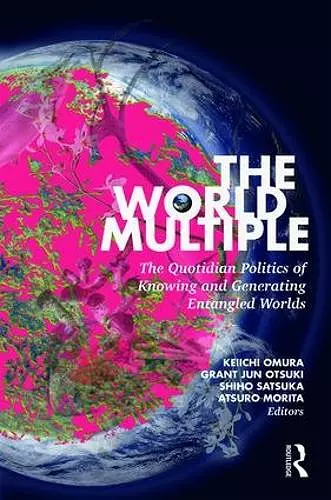The World Multiple
The Quotidian Politics of Knowing and Generating Entangled Worlds
Atsuro Morita editor Shiho Satsuka editor Keiichi Omura editor Grant Jun Otsuki editor
Format:Hardback
Publisher:Taylor & Francis Ltd
Published:6th Nov '18
Currently unavailable, and unfortunately no date known when it will be back
This hardback is available in another edition too:
- Paperback£41.99was £41.99(9780367478056)

The World Multiple, as a collection, is an ambitious ethnographic experiment in understanding how the world is experienced and generated in multiple ways through people’s everyday practices. Against the dominant assumption that the world is a single universal reality that can only be known by modern expert science, this book argues that worlds are worlded—they are socially and materially crafted in multiple forms in everyday practices involving humans, landscapes, animals, plants, fungi, rocks, and other beings. These practices do not converge to a singular knowledge of the world, but generate a world multiple—a world that is more than one integrated whole, yet less than many fragmented parts.
The book brings together authors from Europe, Japan, and North America, in conversation with ethnographic material from Africa, the Americas, and Asia, in order to explore the possibilities of the world multiple to reveal new ways to intervene in the legacies of colonialism, imperialism, and capitalism that inflict damage on humans and nonhumans. The contributors show how the world is formed through interactions among techno-scientific, vernacular, local, and indigenous practices, and examine the new forms of politics that emerge out of them.
Engaged with recent anthropological discussions of ontologies, the Anthropocene, and multi-species ethnography, the book addresses the multidimensional realities of people’s lives and the quotidian politics they entail.
"This is no less than a trans-world colloquium, sustained in a brilliantly focused way on a subject of huge contemporary interest. A remarkable span of anthropologists speaking to one another, their inspiration lies at once in the provocation of Annemarie Mol’s pioneering analysis of ontological multiplicity, exemplified in the medical body, and in a burgeoning field that sees its scope as multi-species studies at a moment of enhanced ecological sensitivity. The outcome is nothing less than a new dynamism in descriptive practice. Re-describing the politics wedded to a ‘one world’ view of life, a contemporary critical urgency, means re-describing the world. In times of crisis we constantly tell ourselves we must think again—one of the most powerful messages of these ethnographic illuminations is that this applies as much to familiar terrain for the anthropologist as to the unfamiliar. They invite us to think again about where and when and who we think we are."
–Marilyn Strathern, Professor Emeritus, Social Anthropology, University of Cambridge, UK
"If the world is more than one, the question rises how it hangs together. The contributions to this book tackle that very question. They present astutely analysed cases of encountering, juxtaposing, intertwining, coordinating, interfering, co-existing, translating, and further kinds of going-on between different (but what is different?) versions of a wondrous world—that is less than many."
–Annemarie Mol, Professor of Anthropology of the Body, University of Amsterdam, the Netherlands
"This book can be read as an argument to the effect that 'world' should be taken as an uncountable noun. It therefore displaces the traditional debate about how many worlds there are, asking instead how much world is there in the many, otherwise uncountable multiepistemic, transpecific, extracategorial, variontological assemblages that do the real. One of the disquieting answers to be found in The World Multiple is that the dominant modern way of doing the real is making less and less world worth living. And yet, we cannot but remain attentive to the flourishing 'arts of living' on this damaged planet; nay, get ready to practice them ourselves."
–Eduardo Batalha Viveiros de Castro, National Museum of the Federal University of Rio de Janeiro, Brazil
"Ontological multiplicity encounters postcoloniality: this book is essential reading for all scholars interested in struggles over nature, culture, and knowledge in the asymmetrical worlds in which the profoundly different realities of modernity and indigeneity are entangled together."
–John Law, Co-Director of ESRC Centre for Research on Socio-Cultural Change (CRESC) and Director of the Social Life of Method Theme within CRESC, UK
ISBN: 9781138314825
Dimensions: unknown
Weight: 530g
278 pages